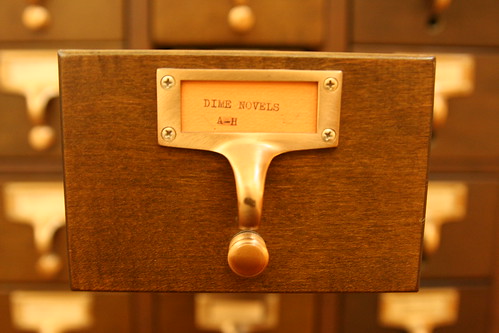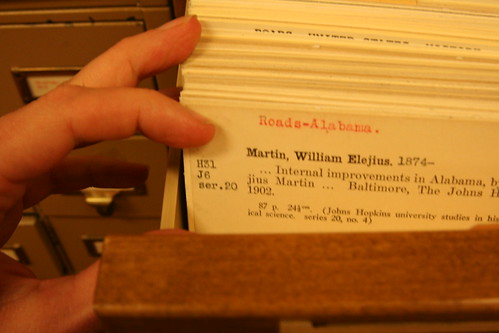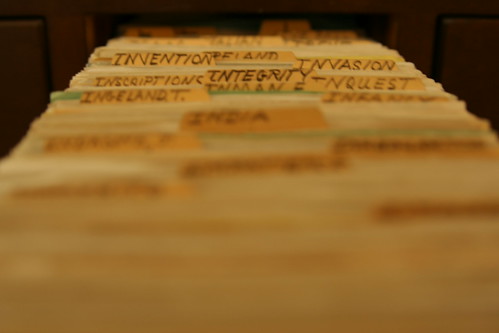
Dream Scenario: The Web 2.0 Academic Journal becomes a bastion of curatorial authority on the internet, helping both scholars and the public discern the most current understandings of the world with certainty that they are navigating with the aid of expert opinion.
The web suffers from a crisis of authority which is being met on the individual, rather than the collective and disciplinary level. For questions of disciplinary fields, for example, wikipedia is likely to be irrelevant and useless. Far more useful, from my point of view, have been peer-to-peer exchanges on delicious.com, librarything, and twitter, where colleagues in proximate fields have openly shared their course reading material, current research, and private canons.
In these sharing sites, individuals tag interesting citations with a series of terms most relevantly useful to their own practice. Users are less concerned with the interoperability of those selected terms than with the project of generating as many accurate, natural-language keywords as possible (see "folksonomy" entry in Wikipedia). The collected mass of these tags becomes an ultimate subject catalog to all the possible subject headings that might apply to any given website. Particular individual users become peculiar sources of authority for a given subject heading (for example, http://delicious.com/bibliparis4/, an expert archivist at the Université Paris-Sorbonne, is an authority on the best online archives, especially in the Francophone world.
Journals have the opportunity to weave themselves as crucial threads in the fabric of online conversations if they begin tagging, becoming collective repositories of the best, collectively-ratified articles and citations available for download on the web.
In a world where the primary tools for finding new scholarship are tagged, social databases like delicious and librarything, the most efficient form of journal interface with the world might be a for journals to scrap their websites and become collective, tagging entities.
2.a) The advantage of having an official canon of online material ratified by editors.
In the world of the traditional print journal, scholars vied to get a Journal of Modern History citation on their vita because it stands for something. What if there was a http://delicious.com/victorianstudies and http://delicious.com/journalofmodernhistory?
Such a stream of official citations could come to stand in for the private account of a collective recognized for setting a standard in the field, providing much the same function as the old print citation in terms of scholarly participation and professional standing. Being collected in those entries could still stand for the product of collective vetting among recognized scholars, standing out in the same way that my more famous colleague Danah Boyd's collection, http://delicious.com/zephoria, is better-read than my own (http://delicious.com/joguldi).
2.b) The editorial voice.
It might seem that if the Journal of Modern History disbanded its website in favor of a delicious stream, much would be lost: for instance, the editor's voice. Not necessarily. Perhaps invited keynote editorials might deserve a special tag, setting them apart from other tags; perhaps certain articles in the JMH tagging stream would also be tagged "featured article" or "special edition."
Consider: the editor-in-chief of The Journal of British Studies for 2009-2011 has a blog, which she has maintained since 2007 and keeps writing through 2020. For the years 2009-2011, the blog entries which she writes that pertain to the field of British Studies and are ratified by the rest of the Board become tagged "editor-in-chief" on http://delicious.com/journalofbritishstudies. The researcher who searches "2009" and "editor-in-chief" under that stream will find that subset of her articles, or they can search "editor-in-chief" for the full download of editorials for JBS.
2.c) The freedoms of web 2.0 journal operation.
Web 2.0 journals that take their primary responsibility as curatorial have no need for official publication from the university press system. They are not dependent on the income model of the university press, and they have no reason to collect subscriptions: their purpose is disciplinary service and public access. There is no reason for the articles published in this format to be made private, or to require elaborate fee-charging mechanisms.
---
Over the next week, we're offering some tentative principles for rethinking journals by way of sparking conversation. At first, these thoughts will take the form of blog entries like this one, where visitors can add comments at the end of every note. We welcome your reactions -- especially sets of alternative principles or concerns that may have been overlooked. At the end of the week, we'll be integrating the original principles with your comments into a wiki. Wikis, as you probably know from wikipedia, are pretty good at synthesizing the opinion of a group. They're also not much harder to use than Microsoft Word. The wiki will form an evolving, multi-authored document that will have some permanence and the ability to slow-evolve to reflect the diversity of concerns and strategies on the table. The responses you offer here, the wiki, and the long-term conversation will, we hope, produce a useful overview of the diversity of opinions, offering a substantial statement on the profession for use when the CELJ next convenes live.

